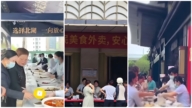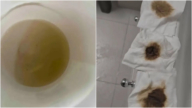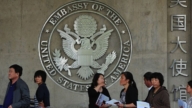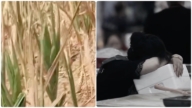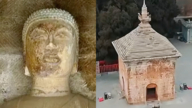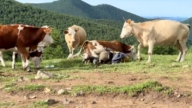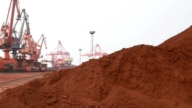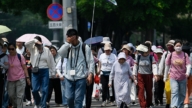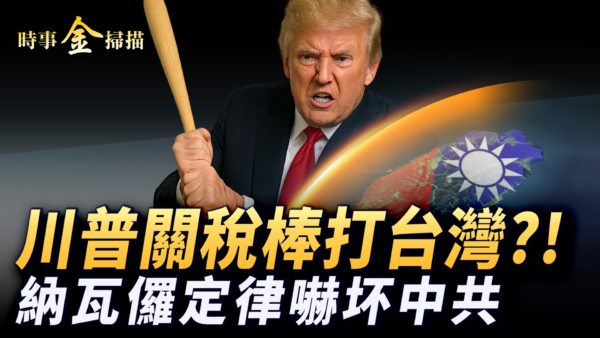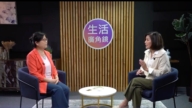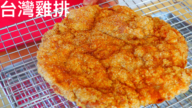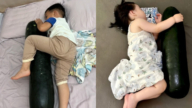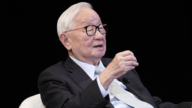【新唐人2014年05月03日讯】在毒食品、毒奶品、地沟油充斥中国的同时,一部介绍中国民间传统饮食文化的系列片,《舌尖上的中国》则受到罕见的热烈好评,收视率甚至接近一些热门综艺节目和偶像剧。但在目前《央视》推出的《舌尖上的中国》第二季,食品却成了配角。这也引发了人们的广泛议论。请看报导。
在中国,除了享受“特供”的特殊群体之外,大多数人都陷入了食品安全的危机,包括:无所不在的土壤、水和空气污染、农产品农药严重超标、无处不在的毒食品,还有那些忧心忡忡的中国父母,在全球范围内搜购奶粉等。
另一方面,与危机重重的现实正好相反,《舌尖上的中国》这部介绍中国民间传统饮食文化的系列片,则用唯美的画面和温暖情调超越现实,详尽无遗的展示了各种独具中国特色的美食,从酥油蜂蜜、清炖跳跳鱼到雷山鱼酱,再到泉州萝卜饭,这些美食背后的故事给人们留下了深刻的印象,受到观众的追捧。
人们也以能在电视上看到家乡的美味食物而自豪。
广州《南方都市报》对此指出,中国城市化的速度在人类历史上前所未见,地方文化的多样性也以惊人的速度消失。那些多样、为吃饱、吃好而充分开掘的生存智慧不可再得,如同逝去的活化石。人们对乡村生活的怀旧、对精美食物根深蒂固的向往,和食品安全危机引发的憧憬,都投射在了这部记录片上。
中国诗人和文化评论家叶匡政表示,《舌尖上的中国》第一季,由于比较真实的反映了中国发达的饮食文化,受到人们的欢迎。但在中国,优秀的记录片是不多见的。
中国诗人和文化评论家叶匡政:“其实中国记录片,它是处在一种非常衰落的趋势,因为中国的很多记录片都被认为是为意识形态说话的,尤其是在电视台里面,能播的这些记录片。”
最近,《舌尖上的中国II》在《央视》开播,与第一季赢得满堂彩的情况完全不同。
美国《华尔街日报》就以“《舌尖上的中国II》有点变味儿”为题,刊发评述文章说,这部记录片制片人似乎更在意扣动观众的心弦,食物的制作者和食用者成了主角,而不是食物本身,喧宾夺主。
文章还引述很多中国观众的话指出,《舌尖上的中国II》似乎已变成一档爱国主义教育节目,而不再是一部纯粹的美食记录片,试图把个人情感上升到政治层面。
据记录片官方网站介绍,《舌尖上的中国II》将涵盖教育、富士康以及单亲家庭等主题。
美国《华尔街日报》也对此表示,这些与食物有何关系还不得而知。
其实,在第二季首映礼上,《央视》台长胡占凡在讲话中,就把《舌尖上的中国》的“吃文化”与中共主席习近平的“中国梦”联系到了一起。
中国独立中文笔会会员朱欣欣表示,任何事情在中国都可能被“泛政治化”,因为中共的政权需要装修、需要化妆,需要找到合法的统治借口。
朱欣欣指出,中国人要想找寻中国传统文化,台湾、南韩等东亚周边的一些国家,比大陆更是理想之地。
中国独立中文笔会会员朱欣欣:“因为这个政权合法性缺乏基础,缺乏合法性的来源,它就需要在社会的经济、文化等等其他方面来要寻找所谓的合法性的借口。通过把所有的社会的所谓它认为的成就、一些好的地方,都归功于它这个制度、它这个政权。”
大陆网路作家荆楚认为,“吃”是人动物化的本能,一个民族过高的强调和拔高这些本能的行为,那么就显得那个民族在道德方面、在思想文化层面低能了。
大陆网路作家荆楚:“一个人在满足了基本的生活需求之后,应该向更高层次方向发展,这个国家、这个民族才有前途。就是要追求社会的真义、追求社会的公平,要追求老百姓的尊严,这些基本的价值观。得向这方面发展。”
荆楚表示,现代文明社会,都是在关注生活的品质,但在中国食品安全都不能保证。差距也太远了。
采访/易如 编辑/宋风 后制/孙宁
A Bite of China Turns Sour
When Chinese markets are filled with toxic food, tainted milk,
and gutter oil, the CCTV documentary, ‘A Bite of China’
gained popularity and high ratings.
In its second season, food took a supporting role and the
audience was quite dissatisfied. Please see the report.
In China, the elite groups enjoy the special produce, but the
majority of Chinese people are at risk from food safety issues.
These include soil, water and air pollution, and high levels of
pesticides, chemical residues, toxic foods and tainted milk.
The worried Chinese parents are shopping overseas
for safe infant formula.
In contradiction to the crisis-ridden reality of food in China,
the documentary ‘A Bite of China’ introduced traditional
Chinese cuisines in elegant and warm images outside reality.
The audiences were impressed and
the films were highly praised.
Many are proud of their home town delicacies.
Southern Metropolis Daily commented that as urbanization
continues cultural diversity is disappearing at an alarming rate.
The wisdom and diversity in fine food are missing.
Peoples’nostalgia for rural life and fine cuisines initiated by
daily food safety issues were reflected in the documentary.
Poet and cultural critic Ye Kuangzheng indicates that the first
season of ‘A Bite of China’ was welcomed because it showed
the true Chinese food culture.
After all, good documentary is rare in China today.
Ye Kuangzheng, poet and cultural critic: “In fact,
documentaries are declining in China, because they
only serve to speak on behalf of the ideology."
The second season of ‘A Bite of China’ recently aired on
CCTV, however, was not so welcome.
The Wall Street Journal Chinese edition stated that ‘A Bite of
China II’ was a little off-taste.
The food makers and the consumers became the main theme,
and distracted from the topics of the film.
Many Chinese viewers considered ‘A Bite of China II’ a
patriotic education program, shifting from personal indulgence
in purely tasty food to political propaganda, said WSJ Chinese.
According to the official website of the documentary,
‘A Bite of China II’ covers education, Foxconn, and
single-parent families.
WSJ questioned the relation of the topics to food.
In the premiere of ‘A Bite of China II’, CCTV Director
Hu Zhantai actually addressed the connection between the
documentary and Xi Jinping’s ‘China Dream.’
Independent Chinese PEN Center member Zhu Xinxin said
that anything in China is likely to be “politicized" to whitewash
the Chinese Communist Party (CCP) legality in ruling.
Zhu Xinxin indicates that traditional Chinese culture is better
served in other East Asian countries such as Taiwan and Korea
than in the mainland.
Zhu Xinxin: “The CCP lacks legality or sources of legitimacy.
They are seeking excuses to legitimize themselves through the
economy and culture.
Therefore, they try to connect achievements from society
to the CCP system and the regime."
Internt writer Jing Chu believes that “eating" is an instinctive
behavior of people turning into animals.
When this instinctive behavior was excessively emphasized
and overstated, it showed that the moral and ideological
culture of the nation is declining.
Jing Chu, Internet writer: “When the basic needs of life are
met, pursuit of higher level development will lead to a better
future for the country and the nation.
That is to pursue the true meaning, the justice, the dignity of
the society and the people.
These are the fundamental values
that ought to be further developed."
Jing Chu says that while modern civilized societies are
about quality of life, the basic food safety is still highly
questioned in China. The gap is just too wide.
Interview/Yi Ru Edit/Song Feng Post-Production/Sun Ning


